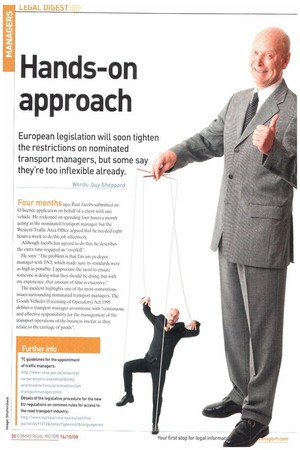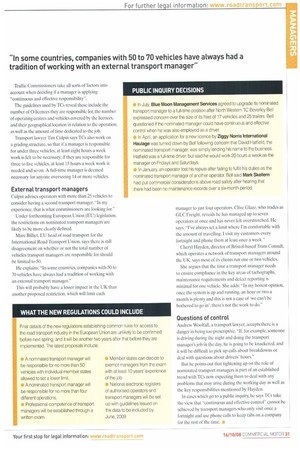Hands-on approach
Page 30

Page 31

If you've noticed an error in this article please click here to report it so we can fix it.
European legislation will, soon tighten the restrictions on nominated transport managers, but some say
they're too inflexible already. ,k Words: Guy Sheppard Four months ago, Paul Jacobs submitted an 0-licence application on behalf of a client with one vehicle. He reckoned on spending four hours a month acting as the nominated transport manager. but the Western Traffic Area Office argued that he needed eight hours a week to do the job effectively.
Although Jacobs has agreed to do this, he describes the extra time required as "overkill'.
He says: "The problem is that I'm am ex-depot manager with TNT, which made sure its standards were as high as possible. I appreciate the need to ensure someone is doing what they should be doing, but with my experience, that amount of time is excessive."
The incident highlights one of the most contentious issues surrounding nominated transport managers. The Goods Vehicles (Licensing of Operators) Act 1995 defines a transport manager as someone with "continuous and effective responsibility for the management of the transport operations of the business insofar as they relate to the carriage of goods". Traffic Commissioners take all sorts of factors into account when deciding if a manager is applying "continuous and effective responsibility".
The guidelines used by TCs reveal these include the number of 0-licences they are responsible for, the number of operating centres and vehicles covered by the licences, and their geographical location in relation to the operation, as well as the amount of time dedicated to the job.
Transport lawyer Tim Culpin says TCs also work on a grading structure, so that if a manager is responsible for under three vehicles, at least eight hours a week work is felt to be necessary: if they are responsible for three to five vehicles, at least 15 hours a week work is needed and so on. A full-time manager is deemed necessary for anyone overseeing 14 or more vehicles.
External transport managers
Culpin advises operators with more than 25 vehicles to consider having a second transport manager. "In my experience, that is what commissioners are looking for."
Under forthcoming European Union (EU) legslation, the restrictions on nominated transport managers are likely to be more clearly defined.
Marc Billiet, EU head of road transport for the International Road Transport Union, says there is still disagreement on whether or not the total number of vehicles transport managers are responsible for should be limited to 50.
He explains: "In some countries, companies with 50 to 70 vehicles have always had a tradition of working with an external transport manager."
This will probably have a lesser impact in the UK than another proposed restriction, which will limit each manager to just four operators. Clive Glaze, who trades as GLC Freight, reveals he has managed up to seven operators at once and has never felt overstretched. He says: "I've always set a limit where I'm comfortable with the amount of travelling. I visit my customers every fortnight and phone them at least once a week."
Cheryl Hayden, director of Bristol-based Trans Consult, which operates a network of transport managers around the UK, says most of its clients run one or two vehicles.
She argues that the time a transport manager needs to ensure compliance in the key areas of tachographs, maintenance requirements and defect reporting is minimal for one vehicle. She adds: "In my honest opinion, once the system is up and running, an hour or two a month is plenty and this is not a case of 'we can't be bothered to go in': there's not the work to do."
Questions of control
Andrew Woolfall, a transport lawyer, accepts there is a danger in being too prescriptive. "If, for example, someone is driving during the night and doing the transport manager's job in the day, he is going to be knackered, and it will be difficult to pick up calls about breakdowns or deal with questions about drivers' hours."
But he points out that tightening up on the role of nominated transport managers is part of an established trend with TCs now expecting them to deal with any problems that may arise during the working day as well as the key responsibilities mentioned by Hayden.
In cases which go to a public inquiry, he says TCs take the view that -continuous and effective control" cannot be achieved by transport managers who only visit once a fortnight and use phone calls to keep tabs on a company for the rest of the time.
















































































































































































